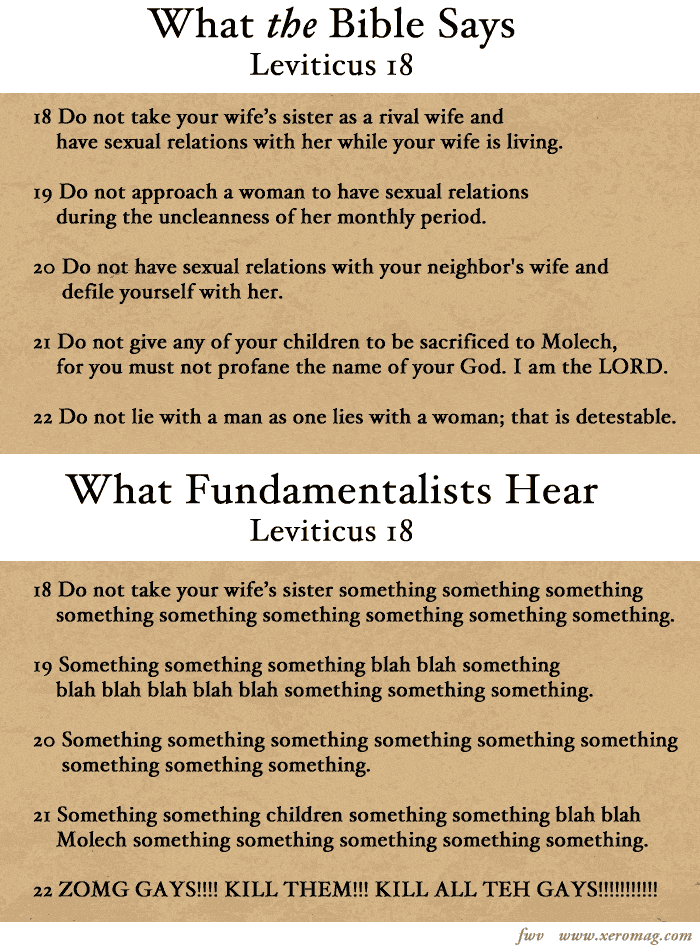
Because Fundamentalists seem to fail at reading, the Bible also says…
20



In 2005, a guy with an obsession for the number five wrote a book called “The Five Love Languages.”
The premise of the book is pretty straightforward, and in hindsight reasonable; different people express love and affection in different ways. The author, Gary Chapman, went on to start an entire empire around the notion, and has even trademarked the phrase “five love languages™”. Since then, he’s continued on to explore the number five in other aspects of human interpersonal relationships; there’s a new book out or coming out or something called “The Five Languages of Apology.”
Which is all well and good, as far as it goes, but I’m a little skeptical about the number five. Why would there be five different ways to express love and also five different ways to apologize? Why not four or six or seventeen? Is it because five is half of ten, and we human beings have a deep sense of emotional resonance with the number ten? Is it because the number five has some sort of magical connection with the ways we interact with each other? Is it just a load of bollocks, and five happened to be the number of ways that Mr. Chapman could think up off the top of his head?
I suspect the answer is the latter. According to Chapman, the five l”love languages”–the five ways that people express love for one another–are words of affirmation, spending quality time together, giving or receiving gifts, giving or receiving acts of service, and physical touch.
And to be fair, there’s some merit in that list. I know people who express affection in each of those ways, and for someone whose preferred way of expressing affection is, say, through words of affirmation, giving gifts might not be as effective. (I personally don’t care much for gifts, giving or receiving, but physical touch is very important to me.)
Problem is, I think that folks have built a religion around the notion that there are exactly five and only five love languages, and I think the reality is that the list is woefully incomplete. There are at least three more that are important to me, and I bet there are still more important to other people.
The three that are missing for me are:
Creating together. This is not the same as “quality time.” It is, instead, the act of bringing another person into the process of making something new, which for me is an extraordinarily intimate thing. When I have created something with someone, I am quite likely to feel much greater intimacy for that person; the birthing of something new is something that’s powerful to me, and sharing it is an expression of love.
The thing itself, once created, becomes a tangible representation of that love. There’s something incredibly powerful in being able to see and touch and hold a thing that would not have existed save for the act of will I’ve shared with another person in bringing it to life.
Nesting together. I would not have guessed this about myself before I moved to Portland. The making of a shared space with zaiah has been something that I feel very strongly about. It’s not an expression if love in the creation of the space, although there’s something of that in there as well; it’s about having that space, which I share with a partner, that carries with it each of our unique signatures.
I’ve lived with partners before, and even built a house with a partner, but that was different; those spaces did not carry our own personal touches the way the home I’m building now does.
Sex. Anyone who thinks that “sex” is merely a spacial case of “physical touch” doesn’t have sex the way I do. Past a certain point, physical touch alone isn’t enough to carry the day. There is a unique kind of vulnerability in sex that is absent from any other kind of touch, and that unique vulnerability, at least for me, carries a tremendous ability to create intimacy.
Note that “sex” in this context does not necessarily imply sticking tab A into slot B. Sex is highly contextual; in the right context, whipping is sex. It’s not the slippery bits touching; it’s the thing that we become when I’m sharing sexual intimacy with a partner, or partners. When I have sex, especially good sex, I let down barriers that other sorts of touch don’t pass through.
And, like I said, I bet there are others as well that Mr. Chapman, in his near-religious fixation on the number five, has missed. Got any more? I want to hear ’em!